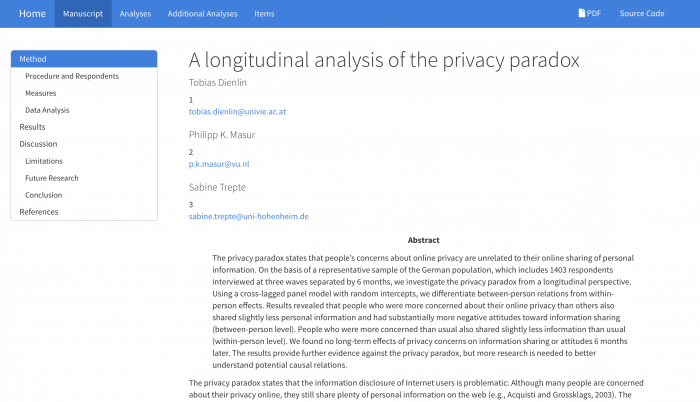One of my major research interest is to understand better the privacy paradox. According to the privacy paradox, privacy concerns don’t affect our online behavior.
In short, everyone is concerned, but still everyone is sharing widely.
I was always skeptical of the privacy paradox, and wherever there’s data on concerns and online sharing I’m eager to analyze it. One analysis, conducted together with Philipp Masur and Sabine Trepte, was recently published by New Media & Society. In this post, I provide a brief summary.
A longitudinal analysis of the Privacy Paradox
In one large research project, run by Sabine Trepte, we collected a longitudinal sample of several thousand Internet users in Germany, asking them about their concerns and their behavior.
We analyzed the data using a so-called cross-lagged panel model with random intercepts. They’re currently among the best tools to analyze longitudinal relations and potential effects, as they allow to differentiate effects within one single person from mere relations between different people.

The results
We found that, averaged across all three waves, people who were more concerned shared slightly less information. People who held more negative attitudes toward information sharing, shared much less. Speaks against the privacy paradox.
From a within-person perspective, if people were more concerned than usual, they shared *slightly* less information than usual. Effect was a bit stronger for attitudes. Again, speaks (somewhat) against privacy paradox.
On a longitudinal perspective, if concerns changed this didn’t affect behavior half a year later. Rather speaks in favor of the privacy paradox — or, could be that effects take place in shorter or longer intervals.

Overall, we believe the paper provides some further evidence against the privacy paradox.
However, relations could be larger, and we also didn’t find long-term effects. Measurement could’ve been better, and other aspects (incentives, infrastructure) also influence behavior.
Open Science
We implemented several open science practices:
- The paper is completely reproducible.
- The data are shared online.
- We’ve built a github website with all information
On the website, you can read the paper, see the analysis (including additional ones), find the link to the data, or access materials such as items.

Finally, this paper took ages to publish. We first presented it at the DGPs Media Psychology conference in 2017, and it took 5 submission rounds at New Media & Society.
So we’re really glad the paper is now finally published!
If you have thoughts, feedback, or criticism, feel free to post a comment below!
